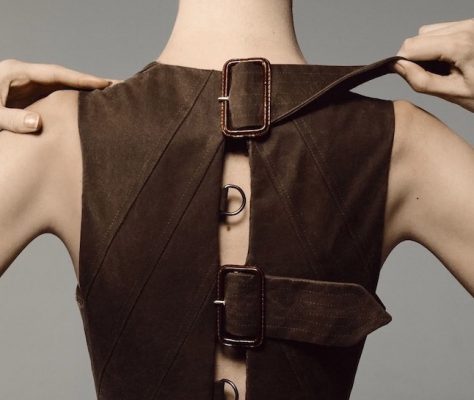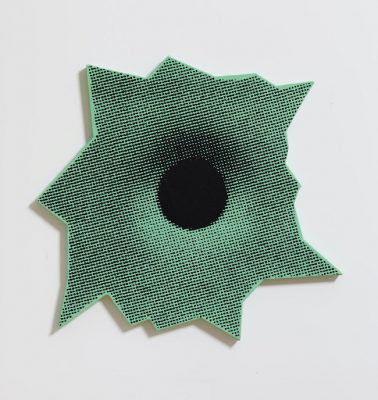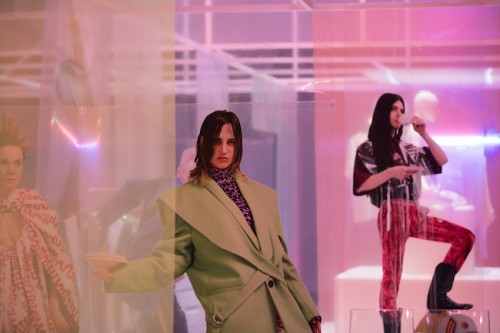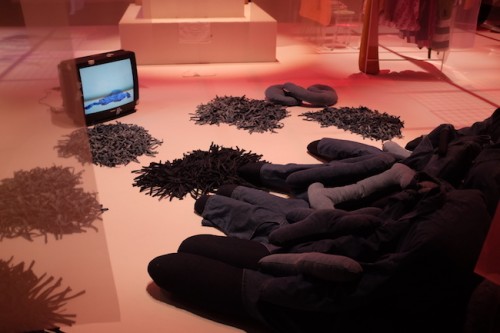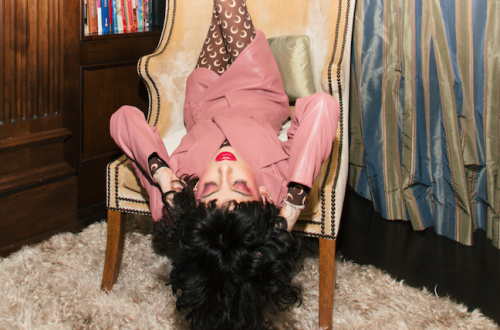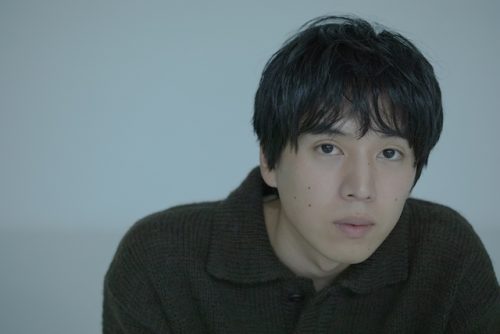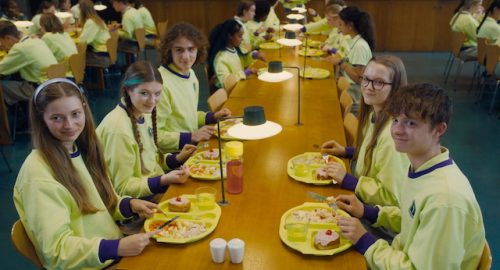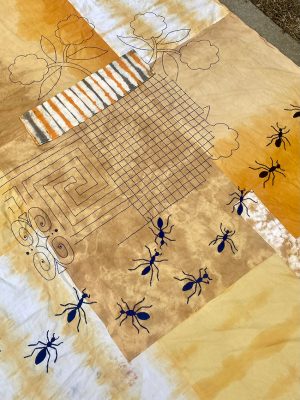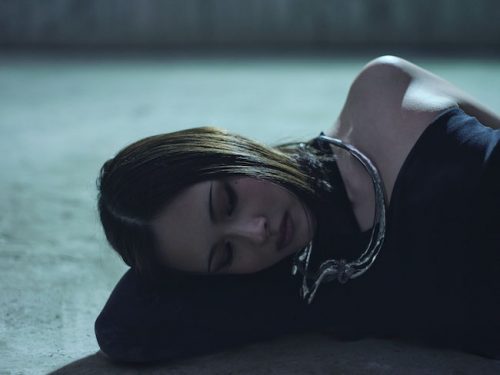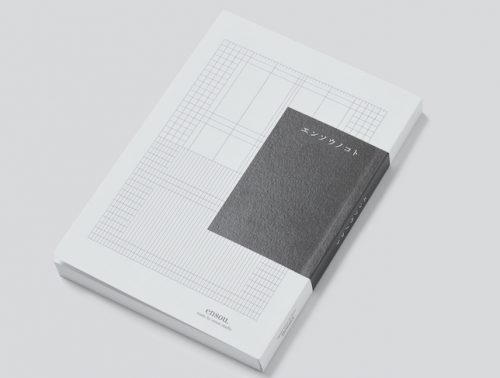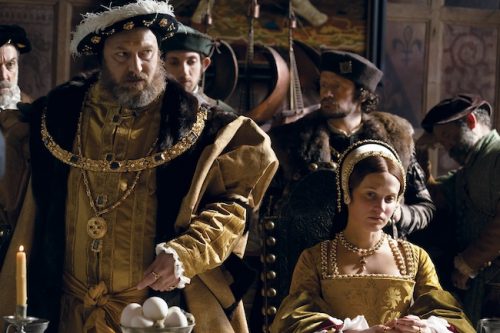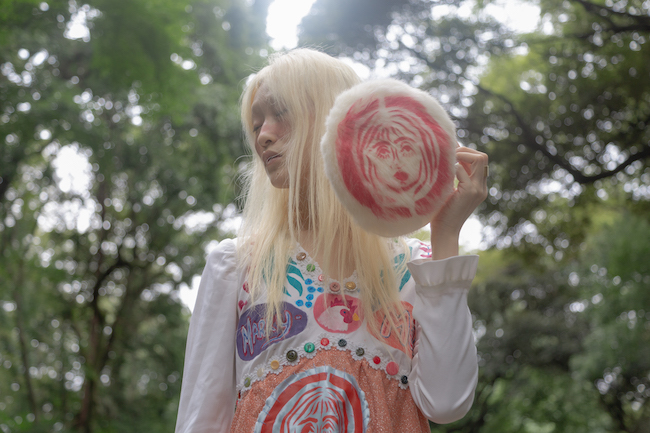
-Can you introduce yourself?
Alice : My name is Alice Cline, and I am a visual artist, designer and filmmaker based in New York City.
-What are the roots to your passion?
Alice : I grew up in South Texas in the US, in a family that really celebrated creativity and art. My Mother was a registrar at a local museum, and that allowed me to be around art and develop a creative eye at a young age.
-What does your outfit everyday depend on? Is it affected by the weather, colors that catch your eye?
Alice : My apartment windows face a park in New York’s East Village, and every morning I look outside to check the weather and see how other pedestrians are dressed. I try to mix color and textures in addition to dressing for the weather, lately I’ve been really into wearing casual and comfortable vintage menswear with a statement coat or unique shoes.
-What period fashion do you like and why do you like it.
Alice : My favorite era that I derive the most inspiration from, in both my work and my daily wardrobe, its the 1960’s and 70’s. The art, film and fashion from that era was so innovative and so playful and chic.
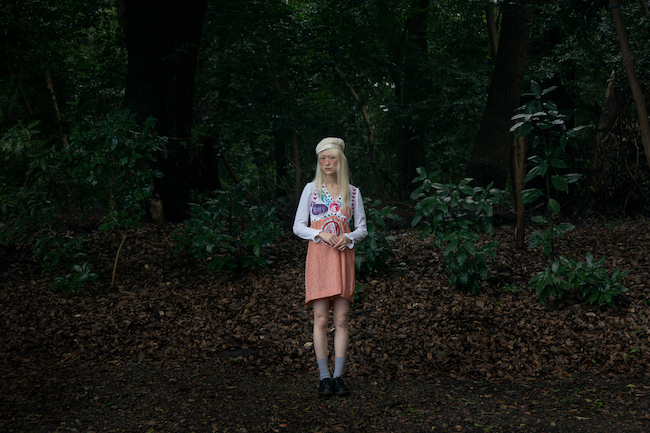
-How would you describe yourself as a child?
Alice : I was a space cadet. I was constantly day dreaming and painting and writing stories. I, like many children, had a vivid imagination and a lot of confidence in my self and my artwork, and I think I’ve been trying to recapture that ever since.
– What does girlhood mean to you?
Alice : Messy lipgloss and scraped knees. Girlhood is scream laughing with your friends, and playing outside, and dressing up in your mother’s clothes. I think girlhood is feeling wild and wanting to be pretty at the same time.
-What is your main source of inspiration?
Alice : I’m really inspired by other artists, in both museums and on social media. Lately I’ve really been interested in the work of @steakbagel and @johnyuyi on instagram. I feel most creative in the evening time after watching a film or looking at art online before I go to bed, when I’m halfway unconscious/asleep is when I get my best ideas.
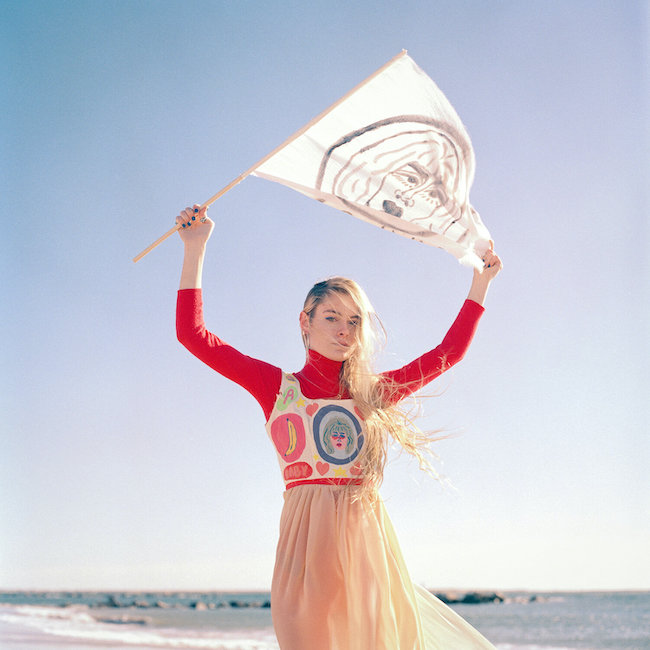
-When you express yourself in fashion, do you have your own philosophy?
Alice : In fashion I’m motivated by sustainability and that art of influence. My work is usually embellishment or reworked vintage textiles with painted patches that depict objects and people I feel connected to.
-What power do you think fashion has?
Alice : I think fashion is so powerful as a method of self expression. We see it everyday, maybe more than any other form of art. Clothing can share stories and inspire others, and is a crucial but often forgotten aspect of social change and progress.
-Fashion is not just about appearance; it is also a tool for political statements. How do you think the Black Lives Matter movement will change fashion?
Alice : I think it already has. BLM has really made people think about what they’re wearing and how their choices and privilege affects others. I’m think that Black Lives Matter will not only change the institution of fashion by highlighting and celebrating Black artists and designers, but also reject and change a lot of the issues of representation and discrimination that plague that fashion industry.
-How do you feel your ‘race’ is represented in the fashion world?
Alice : Yes. I’m white and American, so my race has actually been overrepresented in the fashion world.
-How do you feel that your identity plays a role in making art? Do you feel that it occasionally limits you?
Alice : Absolutely. In all of my work, I am trying to reveal parts of who I am visually. However sometimes I’ll finish a piece and look at it and not recognize myself. I also think because I am white and American, my capability to create in a way that is authentic and culturally diverse is limited, even stunted. The only way I’ve found to resolve this is to be inspired by and collaborate with other artists and designers that have different background than my own.
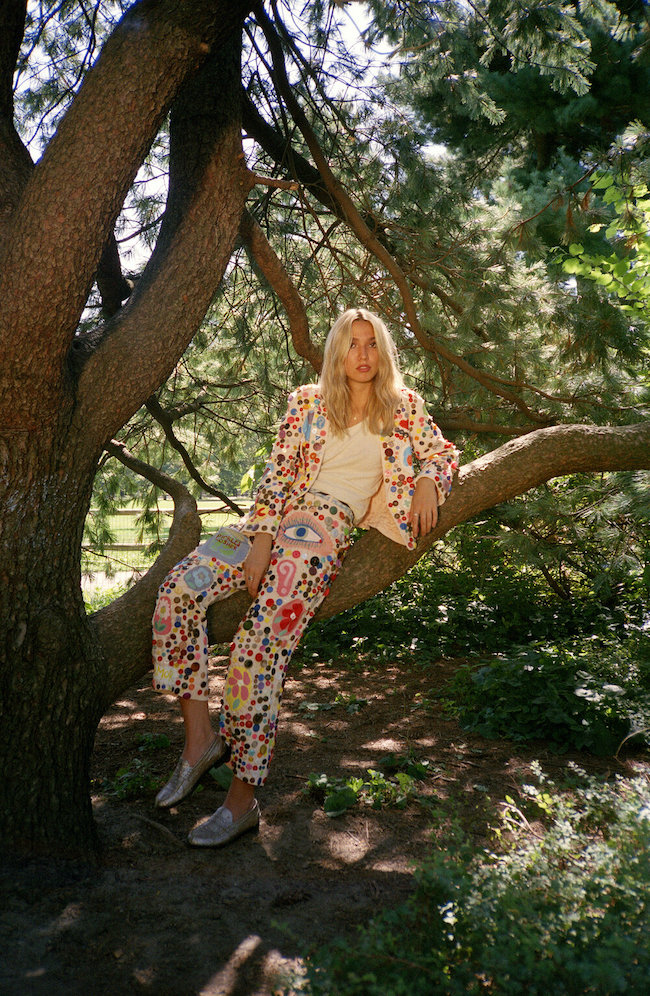
– Your style tends to use many colors and hand-drawn, how did you come to make this kind of art?
Alice : Before I started designing clothing I was only a visual artist, and primarily a painter. But, I felt like I was making paintings to just post on instagram once and then live in my portfolio forever, never to be seen again. I wanted my artwork to be seen by lots of people and transcend medium, so I started painting vintage clothes and gifting them to my friends to wear. Overtime my work began to include appliqué and embellishments and buttons, with lots of color and campiness. I think it’s sort of funny, or maybe ironic, that my work began with the motivation to be worn and seen often, and now the pieces are so delicate and detailed that they can really only be worn very carefully and short periods.
-I love your textiles. What textiles is to you?
Alice : I use mainly vintage or repurposed textiles in my work. To me, textiles are the base of a piece. They are the foundation to be manipulated and built on top of, and they should be cohesive and thoughtful.
-Due to the pandemic, the way fashion is presented is very different. What are ways you continue to make work that is original?
Alice : I was at home staying with my family in Texas during quarantine so I was really inspired by my childhood home and the culture there that I haven’t really experienced since I moved to NYC. I worked on pieces that I mailed to my photographer friends to be shot as a self portrait or at a distance. I also think the FaceTime photoshoots that got really popular during quarantine are really interesting as well.
-How do you communicate your views on climate change and politics through fashion? and how do you maintain your originality through that.
Alice : I reuse and repurpose vintage fabrics and textiles to give them a second life. Fashion is a huge contributor to climate change, the industry is hyper-focused on newness and consumerism. Thrifting and reducing the amount we consume might not make a huge or worldwide change, but I think that everyone should be considerate about the impact they have on others and our earth. By being thoughtful about what we buy and who we support, it shifts the focus of the fashion industry towards more sustainable values. I want to encourage this in my work, so I try to express it in my methods and materials.
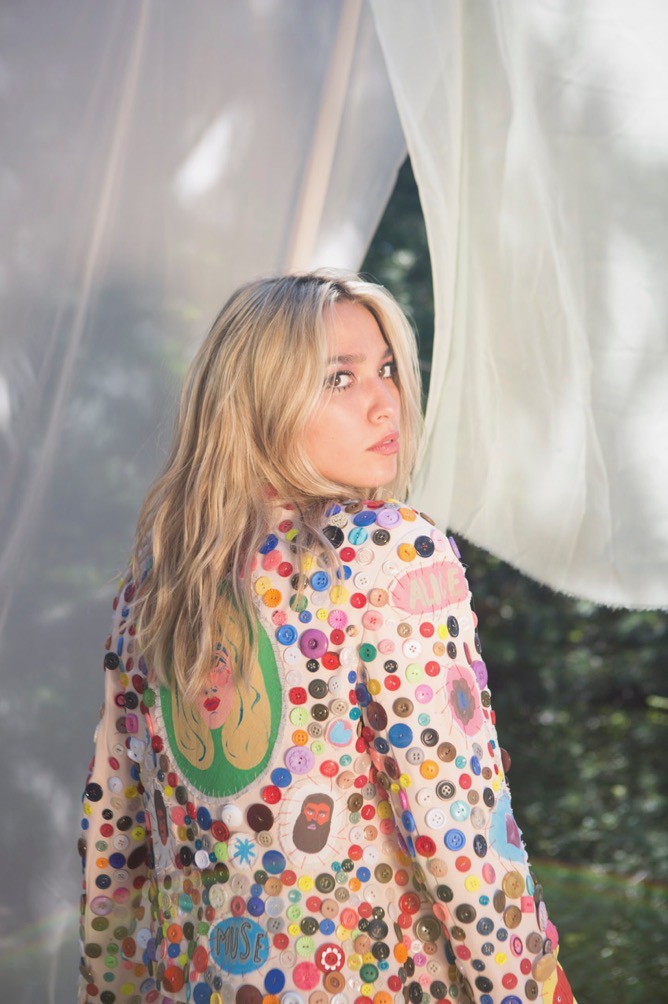
-With quarantine and staying at home, many find it harder to be creative. What are ways you get inspiration?
Alice : I’ll be honest, it’s been really hard. When I was quarantining with my family I was really struggling to maintain my momentum, and spent a lot of days just watching classic movies and television shows from the 80’s. But now I’m back in New York, and I live with my good friend Kierst (@chowkiersten) who is a musician. She’s always playing music or journalling, and the creative energy she puts out really helps me be creative as well. Being back in New York in general helps me get inspired, there’s a sense of urgency here that I missed.
-In a time where you have access to millions of works online, how do you maintain original work? Are you affected by likes and followers on social media?
Alice : I do worry sometimes about ripping off other people work unintentionally, or creating something and realizing that I’ve seen it somewhere else before. On the internet we are constantly bombarded with images, and it can sometimes make me feel alienated from my own imagination. I wish I wasn’t bothered by likes or followers, but in the current industry if you don’t have a large platform, it can feel like you’re making art for no one to ever see. I often feel like I spend months creating something for it to only end up posted on instagram. Art needs an audience, and it can be frustrating to feel like there’s no way to access one.
-When are moments that you discover your identity. When is the time you feel that you break out of your own identity?
Alice : I am most aware my identity when I venture into self portraiture. Recently I was working on a short film with a narrative essay about myself, and I made a marionette in my image to dance and manipulate on camera. It was really strange to be visualizing and reinterpreting my identity in a way that others could digest. I feel like I break out of this when I collaborate with other artists, or create things to honor the people that I love.
-Were you always into the movie? What was the movie you discover for the first time yourself? Who was the artist you got actually into?
Alice : I was always into movies, and funnily enough, it was Tim Burton’s Charlie and the Chocolate Factory that made me want to be a filmmaker. As a child I was so fascinated by it, and the way that entire other worlds can be created on screen. The idea that I could do that was even more exciting. As an adult I’m primarily influenced by the Hollywood Renaissance in the 60’s and 70’s and contemporary coming of age directors like Wes Anderson, Taika Waititi, and Richard Ayoade. My favorite feeling is when I leave a theatre after watching a great movie and think, “wow I really want to do that.”
-Fashion and the film influence each other. What the film will you plan to make ?
Alice : Fashion and clothing are central to self expression, and they can communicate so much about a character and who they are in a film. I want to make films that highlight this, and use fashion as a source of symbolism and tone.
-The pandemic and climate change has shaped fashion in a certain way. What is your opinion on this?
Alice : The pandemic really exposed a lot of flaws in the fashion industry, within it’s reliance on seasonal consumerism and narrow margins. This trait, and fast fashion/mass production, has really exacerbated climate change. I’m hoping that as we turn towards owning clothing that is either secondhand or designed and made to last, that fashion will be more of a catalyst for change instead of a part of the the problem.
-Currently, fashion is experiencing a big transition. As a fashion student in this era, what are your next steps?
Alice : It’s difficult for sure. I’m graduating this year so I’m planning to continue my artistic practice but also try to find a way to support myself in New York. So many magazines and production companies are closing or going out of business after the pandemic, its really daunting to try and find your way right now. I’m focusing on doing what I can, and trying to stay inspired.
-What is your advice to someone who is trying to step out of their comfort zone in fashion, to test their limits and take action.
Alice : Honestly, I still struggle with stepping out of my comfort zone sometimes. My best advice is to study artists that you love that have challenged boundaries, for me I’m constantly inspired by David Byrne, David Lynch, and Andy Warhol, and think of how their ideas can be translated to a contemporary setting. Find the parts of your art that express who you are, and think of a way to apply them in other ways. I’m also a huge advocate for interdisciplinary art. Often artists and designers are too loyal to a style of creating. Changing mediums, even if you ultimately return to your favorite, really helps enhance and evolve your work.
Alice Cline
https://alicecline.com
https://www.instagram.com/alicelcline/
text & edit Ryoko Kuwahara




